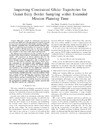Please use this identifier to cite or link to this item:
http://hdl.handle.net/10553/42223
| Title: | Improving constrained glider trajectories for ocean eddy border sampling within extended mission planning time | Authors: | Zamuda, Ales Hernández Sosa, José Daniel Adler, Leonhard |
UNESCO Clasification: | 120304 Inteligencia artificial 120326 Simulación 331913 Vehículos submarinos |
Keywords: | Differential evolution algorithm Particle swarm optimizer Global optimization Control parameters Self-adaptation, et al |
Issue Date: | 2016 | Conference: | 2016 IEEE Congress on Evolutionary Computation, CEC 2016 | Abstract: | This paper extends the performance assessment of an underwater glider path planning approach recently proposed for constrained sub-mesoscale eddy border sampling conditions, for situations benefiting from extended mission planning time. The aim of addressing such situations is to improve the glider vehicle capabilities through improving its off-board controller, which computes an improved trajectory for the eddy sampling task, compared to the usual rather shorter planning time. The improvement in robustness for the controller for several scenarios in this global trajectory optimization is also analyzed, together with comparison to shorter planning time for this autonomous vehicle and environmental data sampling type. As shown through results, the approach is able to provide several useful and non-intuitive solutions, improving in helpful ways. The trajectories for sub-mesoscale eddy sampling are thereby improved, in a way that might be useful for possible machine controller pondering or auto-piloting at open sea, when piloting user feedback is not available or even amidst the consecutive interruptions of user-intensive planning instructions. Managing complexity under limited resources and designing vessel navigation schedule plan under uncertain conditions within such extended mission planning time, therefore improves the mission quality as well. By optimizing trajectories with differential evolution and then visualizing them, we provide human-machine interaction for rapid knowledge discovery, data mining, and presentation of possibly large space satellite captured data sets (Big Data) analysis and exploitation. | URI: | http://hdl.handle.net/10553/42223 | ISBN: | 9781509006229 | DOI: | 10.1109/CEC.2016.7743997 | Source: | 2016 IEEE Congress on Evolutionary Computation, CEC 24-29 July 2016, Vancouver, BC, Canada, p. 1727-1734 |
| Appears in Collections: | Actas de congresos |
Items in accedaCRIS are protected by copyright, with all rights reserved, unless otherwise indicated.
